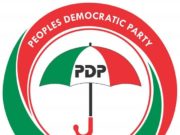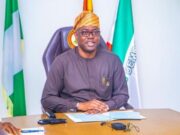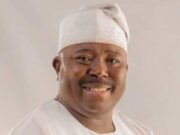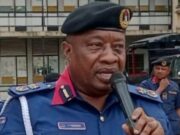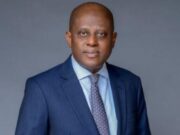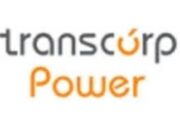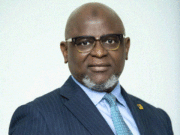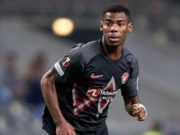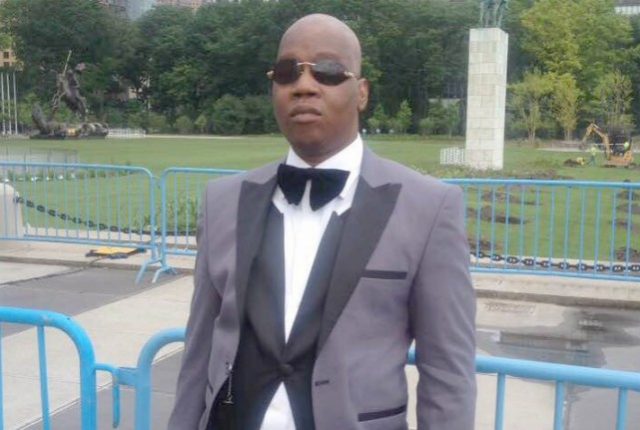He is eloquent. He is brilliant. He is a qualified Lawyer. He is blind. And he is angry. Why? This is Barrister Ayodele Adekanmbi for you. He says despite being party to the adoption of 17 Sustainable Development Goals (SDGs) by the United Nation, successive Nigerian governments have failed to lift a finger to care for People With Disabilities (PWDs).
He recently paid a visit to our corporate office in Ibadan where he spoke about so many issues relating to his fellow PWDs. He spoke with OLAYINKA AGBOOLA and FOLA ADENIRAN. Excerpts:
Can you briefly introduce yourself to our readers sir?
My name is Ayodele Adekanmbi. I am an ‘afoju’ (a blind man). I have been like this since I was born. I am from Eruwa in Oyo State. I am a special being created by God, an ‘Akanda’ in whatever way you can imagine. And also, by God’s grace, I am the Executive Director, Disability Empowerment Solution. I was formerly, Special Adviser to ex-Governor Adebayo Alao-Akala on Matters affecting People With Disabilities.
You seem very passionate about the welfare of PWDs. Many would have assumed you will take care of yourself first before thinking of helping others…
(Cuts in)…you see, that is why I am always expressing my anger, my anguish, my dissatisfaction against successive governments in Nigeria. Nobody loves us – I mean those of us you people regard as disabled. I am passionate about us because I know how it feels to live with disabilities. Now, you can see me, I cannot see you. If I am happy or sad, nobody cares.
During one of the interviews I granted the Nigerian Tribune, I expressed the same sentiment that Nigerian PWDs are not feeling the impact of government in their lives, it is pathetic that the adoption of 17 Sustainable Development Goals (SDGs) by the United Nations, and the role of these goals, in building a more inclusive and equitable world for PWDs, is a mirage in the Nigerian context.
Although the Nigerian government ratified the United Nations Convention on the Rights of Persons with Disabilities (CRPD), it is pathetic that it has not done anything as regards this to give it any credit. They only signed it because other countries did. There is obviously nothing to show for it as Nigeria does not have any law that borders on people living with disabilities.
The Disability Bill, which is supposed to protect the rights of children, women and PWDs generally, has gone through three past presidents, right from President Olusegun Obasanjo’s era and was never passed to law. It went through President Goodluck Jonathan twice, both when he was acting president and president, and he didn’t sign it either, saying that the financial implication was too much for the country to bear. I was a delegate during the last National Conference and we passed over 118 resolutions that border on PWDs and their families, yet nothing has been done on that so far.
So, what do you now do as a way of keeping the struggle for recognition of PWDs’ rights by Nigerian government?
I am doing my very best. I have been to over 52 countries of this world in my quest to ameliorate the sufferings of my people. Check the records, when I worked in government as a Special Adviser to Governor Akala, I virtually eradicated street begging by my people.
Now, I engage myself in carrying out researches on how PWDs can live like any normal person. Look at our situation in Nigeria, there is really no thought about us.
Having access in all facets for PWDs seems unattainable in Nigeria. Of all the banks in our country, only one has ramps at its branches where those on wheelchairs can use, unlike many other banks where PWDs do not have access to the banking hall. In terms of education, many universities are not conducive for PWDs. Imagine someone on a wheelchair having lectures on the third floor of a building where there are no elevators. Many have to rely on their colleagues to carry them up the stairs to lecture halls.
Many local airports do not have aid for disabled persons and most times, have to carry a physically challenged person into the aircraft. The walkways on the roads are inaccessible for us. Everything is not just right.
We have many married women living with disabilities, but how many of them can access our markets? Talking about access to health care for instance, many hospitals do not have sign language interpreters to relay what the doctors or nurses are saying to deaf patients. Imagine if a deaf pregnant woman visits a clinic for her antenatal, how is she supposed to communicate?
This issue also persists at the judiciary level. I am a trained lawyer, but I cannot practise in this country because our law reports are not in Braille. And of course, the level of involvement of PWDs in government is not encouraging. The Nigerian government is far behind when it comes to ensuring the rights of PWDs. Our neighbouring country, Ghana has all these things put in place.
Can you elaborate more on your researches?
Yes. I carry out researches on how PWDs can live successfully with their wives and husbands, how they can join the Family Planning campaign. As a matter of fact, let me make a revelation here, the first time I used a condom, I inserted it upside down. So, I feel the pains of my people. That is why I do not sleep. I toil day and night to study how my people can integrate themselves into our largely unfriendly society. I thank God that most of the results of my researches are today in the libraries of the United Nations.
Do you also directly train PWDs?
Of course I do. I also give them psychological pep talk. If you are visually impaired, you can live with pride. You must also interact with people. This is the only way you can get to be alerted when danger looms. If you have staff members, be kind and nice to them. Don’t take your disability as something debilitating or restrictive. Make it cheap. For instance, I often refer to myself as ‘Afoju’ (blind man). If I call my friends on the phone, my line is like this – ‘hello, this is your Afoju friend calling you…’ I do this so that when you talk behind me or you want to abuse me, you will remember that I am not afraid or shy or calling myself an Afoju. So, you will not think of using it to abuse me.
How did you survive when you worked as a Political Office holder?
I believe I performed excellently well. The records are there for anybody to check out. That is why I will say it anywhere that those of us with visual impairments are the best because we are blessed with much more Intelligence Quotient (IQ). Stevie Wonder, our Grand Patron at World Blind Union (WBU) during our convention in Dallas, USA in 2009 submitted that every visually impaired person has sharper brain, IQ that is much more than those not blind. Our brain is not busy because we cannot see and thus, the brain is not busy interpreting many things – especially frivolities. We are thus, more intellectually more focused and useful. We can be much more efficient.
On the issue of political office, I will still say that I am angrier with the Nigerian society and government because they are not willing to give us a chance. Who will give a blind man the chance to become a Councilor not to told of him becoming a governor of a state? Which political party in Nigeria is ready to give a ticket to PWDs? Meanwhile, what is there that we cannot do? The United Arab Emirate, UAE, is the only country I know that does not care about disability. In Nigeria here, we all do. And it is sad.
On a personal note, you recently remarried and some people complained…
(Cuts in) I am Ayodele Adekanmbi. I live, by God’s grace by myself. I am the only one who knows the pains I went through after my wife died leaving me alone with our son. I thank those who stood by me. But I will say here that I am the only one who can interpret what I want to myself. I seek happiness, I seek peace of mind. I seek long life, sound health. Moreover, I am nobody else, I am myself and I can never pretend to be somebody else. Those who complained have a right to do so. My decision to get married is a personal decision. I am carrying my cross. Let all of us endeavour to concentrate on the challenge of carrying our personal crosses. And these crosses can never be the same. I am, by the grace of God, successfully carrying mine.





















